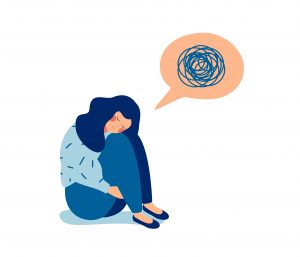There’s a fine line between stress and anxiety. Both can seem very similar and often are confused with one another, especially when you’re helping a youth, friend, or loved one who is experiencing either. The American Psychological Association defines the differences as:
Stress
Generally is a response to an external cause, and for youth this can be any number of things! Triggers can be short-term (deadlines, schoolwork, fights with loved ones) or long-term (chronic illness, discrimination), and typically the feelings of “stress” go away when the situation is resolved. Stress, unlike anxiety, can be positive or negative, it may inspire you to meet a deadline or face a personal challenge or obstacle head on; but it can also cause you to lose sleep, change in appetite, and other negative effects.
Anxiety
Generally is internal or a reaction to stress. It usually involves the persistent feeling of apprehension or dread that doesn’t just “go away,” and interferes with living life. Anxiety is constant, even if there is no immediate threat, and anxiety disorders are common. One of the most common anxiety disorders is “generalized anxiety disorder,” where those effected have excessive, difficult to control, worry which occurs for days to months.
What makes them similar?
Both stress and anxiety effect the mind and body. Both can cause similar symptoms such as:
- Excessive worry
- uneasiness
- tension
- headaches or body pain
- high blood pressure
- loss of sleep
Making it difficult to differentiate the two.
How we can cope?
Both mild stress and mild anxiety respond to similar coping mechanisms. Physical activity, a nutritious and varied diet, and good sleep hygiene can be good starting points, but there are also other ways to cope:
- Keeping a journal.
- Trying a relaxation app or video
- Avoiding excess caffeine
- Identifying and challenge the negative thoughts
- Reaching out to friends or family
Find help.
If you or a youth in your life are struggling to cope, or the symptoms of stress or anxiety begin to interfere with your ability to function in life, it may be time to seek help. A great place to start or to talk about your stress or anxiety is the California Youth Crisis Line. Youth, parents, and anyone who works with youth can call or text 800-843-5200 and be connected to a trained crisis counselor who can help. We also connect you to services and resources available in your area. We’re free, supportive, and available 24/7.

